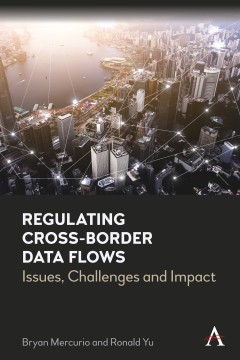Regulating Cross-Border Data Flows
Issues, Challenges and Impact
By Bryan Mercurio & Ronald Yu
Other Formats Available:
E-Book- About This Book
- Reviews
- Author Information
- Series
- Table of Contents
- Links
- Podcasts
About This Book
The adoption of data-driven applications across economic sectors has made data and the flow of data so pervasive that it has become integral to everything we as members of society do – from conducting our finances to operating businesses to powering the apps we use every day. Flows of knowledge and technology are at the centre of new networks driving production and innovation. The increasing use of the Internet of Things (IoT), and the growing amount of data generated, are driving substantial opportunities. Data is now one of the world’s most valuable resources, and its flow across borders is the lifeblood of the global internet economy. Data has already significantly impacted various industrial sectors – e.g. trade, banking and finance, telecommunications, media/entertainment and healthcare – and the global economy overall.
Governing cross-border data flows is inherently difficult given the ubiquity and value of data, and the impact government policies can have on national competitiveness, business attractiveness and personal rights. The challenge for governments is to address in a coherent manner the broad range of data-related issues in the context of a global data-driven economy. While larger economies such as the US, EU and China have clear policies and overarching objectives in place, many smaller jurisdictions have yet to adopt a strategy or framework. This is regrettable, as it is imperative that all jurisdictions have a clear strategy on cross-border data which is designed to meet the opportunities and challenges of the digital transformation. Instead, many jurisdictions currently operate on a “by default” combination of piecemeal legislation and obligations undertaken in free trade agreements.
This book engages with the unexplored topic of why and how governments should develop a coherent and consistent framework regulating cross-border data flows. The objective is to fill a very significant gap in the legal and policy setting by considering multiple perspectives in order to assist in the development of a jurisdiction’s coherent policy framework.
Reviews
“This book paints a rich picture of the issues policymakers should address when regulating cross-border data flows. A must-read for all those interested in governance processes in a global data-driven economy.” —Enrico Bonadio, Reader in Intellectual Property Law – City, University of London, UK.
“The book by Mercurio and Yu provides invaluable insights into the dynamics of the data- driven economy. Building upon a deep understanding of the existing regulatory frameworks and the geopolitical powerplays, the authors charter the way forward for a coherent regulation of cross-border data flows as the lifeblood of our societies.” — PROF. DR.IUR. MIRA BURRI, Chair for International Economic and Internet Law, Managing Director Internationalization, Principal Investigator ERC Consolidator Grant: TRADE LAW 4.0 (2021- 2026), University of Lucerne, Switzerland.
“The professional and diverse academic backgrounds of the two authors have ensured not only the quality of the output but also the unique perspectives of the discussion throughout. The book aims to provide an answer to the challenges of the new economy, it took a holistic approach in examining the pros and cons of the current framework and proposes an interest- based solution.”— Dr. TianxiangHe, School of Law at the City University of Hong, China.
“This book distinguishes itself from the existing one in at least two aspects. For one, it is written by Hong Kong legal academics--HK is a global hub for various data-driven applications, and the HK government has been on the frontline of rolling out new regulatory approaches governing data-related issues. Hong Kong’s policies can inform other jurisdictions; moreover, its unique status as related to the Greater China Area, too, makes Hong Kong experience as a & quot; smart city " an attractive case study. For another, the authors have strong backgrounds in patents/IPRs; this is a very important yet less explored angle in the context of data governance. This book should be read by all scholars, policymakers and lawyers who are keen to capture the dynamics of law and data-driven technologies in Hong Kong, the hub of the most dynamic markets in Asia.”—Dr. Han-Wei Liu, Senior Lecturer, Monash University, Australia.
Readers will benefit from the nuanced comparative analysis of leading FTAs emphasising the subtle differences in the drafting of exceptions to relevant provisions. —IIC-International Review of Intellectual Property and Competition Law
Author Information
Bryan Mercurio is the Simon F.S. Li Professor of Law at the Chinese University of Hong Kong.
Ronald Yu is Director at Arctic Aurora Advisory Services and co-designer of TARID NFT risk assessment system
Series
Anthem Ethics of Personal Data Collection
Table of Contents
Introduction; Key Considerations; Competing Models of Data Governance; A Case Study of Hong Kong; Considerations in Moving Forward.
Links
Stay Updated
Information
Latest Tweets



